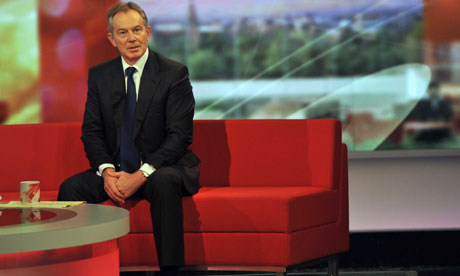
Switching on the Today programme yesterday, it was like an unwelcome blast from the past. There was Tony Blair, that familiar mixture of evangelical fervour and earnest sincerity, putting the world to rights with his views on the coalition, Europe and events in the Middle East.
Money, of course, lay behind his appearance on the show, since he was promoting the paperback edition of his biography. Just as money lay behind his decision to take free holidays at the expense of the Egyptian people while in power, ignoring complaints from families of those being tortured in the country's notorious jails.
At least he supported his old friend Hosni Mubarak after Egyptians risked their lives by rising up to shake off the shackles of despotism. As blood began to run in the streets during the tense standoff in Tahrir Square, Blair hailed Mubarak as "immensely courageous and a force for good".
But what breathtaking hypocrisy to place himself in the vanguard of the movement for change in the region, diminishing the Arab spring to a struggle between modernisers and reactionaries and saying the Gulf states must change or lose our support. This is the man, after all, who earned a seven-figure sum advising the Kuwaiti royal family, and rakes in a fortune giving speeches in the region.
Just recall, if you can bear to, how he cosied up to the Libyan leader he now wants to see overthrown, going far beyond what was needed to bring the maverick Muammar Gaddafi in from the cold as he brokered oil deals and oversaw prisoner transfer agreements that led to the release of the Lockerbie bomber. Little wonder the dictator's son saw him as "a personal family friend".
Even worse was Blair's appeasement of the Saudi royal family in perhaps the most disgraceful episode of his time in office, when his pressure led to the halting of the landmark BAE bribery case. This was an incident that demeaned our country, usurping Britain's legal process to avoid upsetting a repressive and – to use his own words – reactionary regime.
Indeed, it is hard to think of a more reactionary regime. Saudi Arabia is the country currently stopping women from driving cars, and is supplying the troops who crushed the protests in Bahrain with such brutality. It has used oil wealth to export a particularly hardline and corrosive creed around the globe, one that rather flies in the face of our former prime minister's sanctimonious statements on faith and harmony.
The BAE move sent a signal round the world that Britain turned a blind eye to allegations of corruption, ensuring autocrats could feel safe laundering their stolen money here with the help of pin-striped pimps in our finance houses, law firms and estate agencies. Large-scale larceny by the likes of Mubarak, Gaddafi and the Assad family in Syria was one of the primary sparks for the explosion of protest – and all had substantial holdings in Britain.
Shameless corruption is one of the primary causes of poor governance across Africa. Now Blair proclaims it as part of his mission to heal the continent he once called "a scar on the conscience of the world". This does not, however, stop him advising the president of Rwanda who heads a regime accused of atrocities in its invasions of the Congo, growing despotism at home, and sending hit squads to murder exiles living in Britain. After last year's sham election, during which rivals were jailed, newspapers shut down and dissidents shot, Blair sent the president a smarmy message of congratulations hailing his "popular mandate" after Paul Kagame won 93% of the vote. Now he has the effrontery to speak about the importance of freedom of expression in north Africa.
You can almost admire the brazen way Blair ploughs on, ignoring his past and brushing aside uncomfortable facts as he seeks to play a part in shaping the future. But then you remember how he backed an ethical foreign policy before ending up an apologist for torture. And you recall how he promulgated the need for a moral dimension to statecraft before embarking on a war of doubtful legality.
Yesterday, the man whose lack of foresight played such a key role in strengthening the hand of Iran did a round of interviews demanding a clear western strategy in response to the Arab spring. As well as promoting his book, it is part of a desperate bid to promote himself as a future elected president of Europe. Someone should tell him the journey's over.

